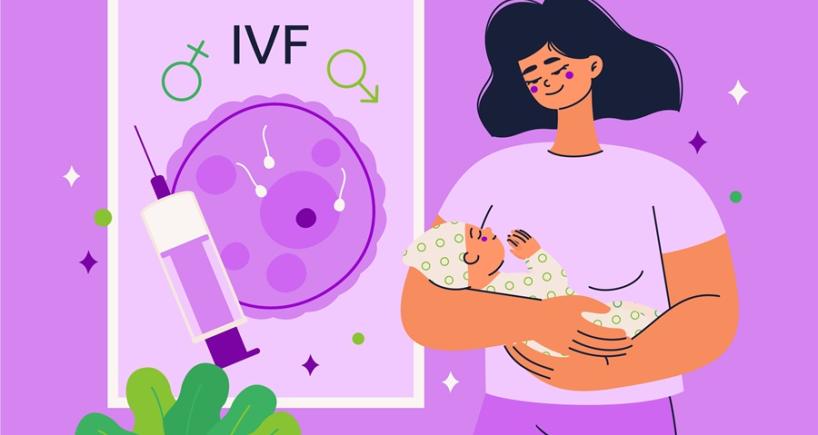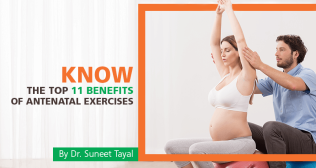
IVF Procedure: A Step-by-Step Guide
Undergoing IVF procedures
Every couple will have an opinion of confusion, tension and difficulties when they have to undergo an invitro fertilization (IVF) procedure to have a baby. As stress is subjective to each individual, this blog may not completely take way your stress but provides knowledge on step-step procedure involved in IVF treatment
Before starting IVF, several tests are performed, including a consultation session to determine the feasibility of the couple's going for IVF.
Diagnostics
The woman is tested for ovarian reserve, if the reserve appears diminished the option of donor oocytes (eggs) may be considered. In addition, hormonal tests such as follicle-stimulating hormone (FSH), anti-Mullerian hormone (AMH) and estradiol will be evaluated. Specific tests such as hysteroscopy, which will ensure that there are no structural abnormalities hindering implantation can be advised. The male partner is evaluated for semen analysis to analyze the sperm morphology, count and motility. For sexually transmitted diseases, HIV serologic testing and hepatitis B and C syphilis serologic test may also be performed.
Preparation
When the treating doctor is confident that the women is healthy based on test and examinations the initial preparation of IVF starts which has following steps
Day 1. The treatment is based on the menstrual cycle. One the first day of the menstrual cycle a woman must inform the doctor to record the tracking.
Ovulation Induction: During this phase, ovaries are stimulated to produce multiple mature eggs. Hormonal injections such as gonadotropins are injected to promote follicular growth. This may continue for two weeks, and patients are recommended to visit the fertility center regularly for blood tests and ultrasounds.
Trigger Shot: An “ovulation-inducing shot” is given after the maturation of your eggs has been confirmed through ultrasounds and hormone test. The injection will be administered 36-hours before your scheduled appointment for egg retrieval.
Egg collection or retrieval: The egg collection day procedure could be done in 15 minutes. With the help of ultrasound guidance, when the follicle has reached the optimal size, the mature eggs are confirmed to be retrieved from the ovaries. The patient will receive intravenous anesthesia, and eggs are extracted. Your doctor may also inform you of the number of eggs retrieved. After the procedure, the patient may feel crampy, bloated or discomfort. Your doctor may advise some painkillers for any such experiences.
Semen Collection and Preparation: Semen sample is taken from male partner; quality of the same is improved by further processing in order to get ready for fertilization.
Fertilization: This is the phase in which eggs and sperm meet through two mediums.
- Conventional Insemination: This is when eggs and sperm are pooled together in a dish so that fertilization occurs naturally.
- Intracytoplasmic Sperm Injection (ICSI) - in this, a single sperm is directly injected into an egg
Embryo cultivation: It's going to take a couple of days for the lab-cultured embryo to become a blastocyte. A nurse or member of the fertility clinic will call you a few days after egg collection to check you're health status and inform you of the number of eggs that are fertilized in a lab. When your embryos are at the blastocyst stage (the optimal time point for achieving pregnancy), you will get ongoing updates from the fertility clinic. At this point they can freeze embryos for a subsequent embryo transfer or go ahead with doing fresh embryo transfer.
Embryo Transfer: During this step, the doctor will assess the quality of embryo and grade them as per their evaluation. Among them only single healthy embryos are meticulously selected and transferred into the uterus. This is to avoid multiple births. This procedure is usually painless and simple and also rarely requires anesthesia.
The technique involves a long, thin catheter holding the embryos along a small amount of fluid that is passed into the uterus under the guidance of abdominal ultrasound to ensure proper insertion of the embryo in the uterus. The doctors will advise limiting vigorous exercise for some days after this procedure.
Luteal Phase Support: During luteal phase of the menstrual cycle, progesterone injections are administered to support successful embryo implantation.
Pregnancy Test: After 9–14 days (about 2 weeks) after blastocyte embryo transfer, the patient must visit the fertility center to check whether the embryo has achieved complete implantation. To evaluate this blood test, a human chorionic gonadotropin (hCG) test is advised, as elevated levels of this hormone signal fetal development and confirm the pregnancy.
Success rates for IVF
The success of IVF depends on several factors. The patient must have reasonable hopes. Sometimes IVF may involve many cycles to achieve a successful pregnancy. Latest research indicated that IVF has the highest probability of success when performed among women aged 30-35 while after 40 years, the success rate reduces drastically.
Popular Searches :
Hospitals: Cancer Hospital in Delhi | Best Heart Hospital in Delhi | Hospital in Amritsar | Hospital in Ludhiana | Hospitals in Mohali | Hospital in Faridabad | Hospitals in Gurgaon | Best Hospital in Jaipur | Hospitals in Greater Noida | Hospitals in Noida | Best Kidney Hospital in Kolkata | Best Hospital in Kolkata | Hospitals in Rajajinagar Bangalore | Hospitals in Richmond Road Bangalore | Hospitals in Nagarbhavi Bangalore | Hospital in Kalyan West | Hospitals in Mulund | Best Hospital in India | | Cardiology Hospital in India | Best Cancer Hospital in India | Best Cardiology Hospital in India | Best Oncology Hospital In India | Best Cancer Hospital in Delhi | Best Liver Transplant Hospital in India
Doctors: Dr. Rana Patir | Dr. Rajesh Benny | Dr. Rahul Bhargava | Dr. Jayant Arora | Dr. Anoop Misra | Dr. Manu Tiwari | Dr. Praveer Agarwal | Dr. Arup Ratan Dutta | Dr. Meenakshi Ahuja | Dr. Anoop Jhurani | Dr. Shivaji Basu | Dr. Subhash Jangid | Dr. Atul Mathur | Dr. Gurinder Bedi | Dr. Monika Wadhawan | Dr. Debasis Datta | Dr. Shrinivas Narayan | Dr. Praveen Gupta | Dr. Nitin Jha | Dr. Raghu Nagaraj | Dr. Ashok Seth | Dr. Sandeep Vaishya | Dr. Atul Mishra | Dr. Z S Meharwal | Dr. Ajay Bhalla | Dr. Atul Kumar Mittal | Dr. Arvind Kumar Khurana | Dr. Narayan Hulse | Dr. Samir Parikh | Dr. Amit Javed | Dr. Narayan Banerjee | Dr. Bimlesh Dhar Pandey | Dr. Arghya Chattopadhyay | Dr. G.R. Vijay Kumar | Dr Ashok Gupta | Dr. Gourdas Choudhuri | Dr. Sushrut Singh | Dr. N.C. Krishnamani | Dr. Atampreet Singh | Dr. Vivek Jawali | Dr. Sanjeev Gulati | Dr. Amite Pankaj Aggarwal | Dr. Ajay Kaul | Dr. Sunita Varma | Dr. Manoj Kumar Goel | Dr. R Muralidharan | Dr. Sushmita Roychowdhury | Dr. T.S. MAHANT | Dr. UDIPTA RAY | Dr. Aparna Jaswal | Dr. Ravul Jindal | Dr. Savyasachi Saxena | Dr. Ajay Kumar Kriplani | Dr. Nitesh Rohatgi | Dr. Anupam Jindal |
Specialties: Heart Lung Transplant | Orthopedic | Cardiology Interventional | Obstetrics & Gynaecology | Onco Radiation | Neurosurgery | Interventional Cardiology | Gastroenterologist in Jaipur | Neuro Physician | Gynecologist in Kolkata | Best Neurologist in India | Liver Transfer



















